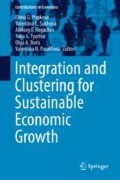Abstract
The objective of the research is study of the transition points of the tax system in order to define its further development. The paper envisages the tax system development regularity as a dynamic system within various forms of economies.
The methods of dialectics were applied in this article such as induction and deduction, analysis and synthesis as well as logic approach to noesis. Theoretic and methodological basis consists of fundamental works in the catastrophic theory, mathematic simulation, and self-organizing system theory represented in the works of Russian and foreign scientists.
Different variants of phase transition from one economic system to another are defined within the present research. The features of each system phase transition within the acknowledged chronology are considered. The key impelling factors for each period are found. The probable development vector of the tax system after the finance crisis in 2018–2020 is determined.
The altered economic conditions will require the formation of completely new tax system where the main taxable items will include labor, financial capital and land. The phase transition will presumably last for several decades and will induce high levels of social, politic, and economic instability in the world. The formation transition takes place under the influence of external factors and only at the precise moment when the previous formation has created the necessary conditions for that transition to the next formation.
References
Alekseev M, Conrad R, Hey J (2004) Taxation and legal reform in transition economies: a preliminary analysis. Econ Bull Transit 3:3–6
Anikin VA (1975) Youth science. The life and ideas of thinkers and economists before Marx. Politizdat, Moscow. ISBN: 978-5-458-48470-1, 384 p
Aristotle (1911) Politics. St. Petersburg. 378 p
Arnold VI (2004) Catastrophe theory. Editorial URSS, Moscow. ISBN: 978-5-397-04233-8, 128 p
Bartenev SA (2005) History of economic theory. The Economist, Moscow. ISBN: 978-5-9776-0142-9, 457 p
Bezrukova TL (2015) Development and approbation of the technique of the assessment of expediency and budgetary productivity of introduction of the tax privilege. Bezrukova TL, Sibiryatkina IV, Ryzhkov AO, Bryantseva LV. Mediterr J Soc Sci 6(3S):68–70
Fernando de Melo (2015). Quantitative analysis in economics based on wavelet transform: a new approach. Fernando de Melo, Maslennikov VV, Popova EV, Bezrukova TL, Kyksova IV. Asian Soc Sci 11(20):66–74
Kene F (2008) Physiocracy. Selected economic works. Eksmo, Moscow. ISBN 978-5-699-18767-6, 1200 p
Keynes JM (2008) General theory of employment, interest and money. Favorites Eksmo, Moscow. ISBN 978-5-699-20989-7, 960 p
Kuznetsov SP (2013) Dynamical chaos and hyperbolic attractors: from the mathematics to physics. Institute of computer research, Izhevsk, Moscow. ISBN: 978-5-4344-0100-5, 488 p
Marshall JF, Bansal VK (1998) Economic engineering. Infra-M, Moscow. ISBN: 0-13-312588-2, 786 p
Nechvolodov A (2013) From ruin to prosperity. Conceptual, Moscow. ISBN 978-5-905692-15-4, 128 p
Nicolis G, Prigogine I (1979) Self-organization in non-equilibrium systems. Mir, Moscow. 512 p
Platon (2007) The compositions in four volumes. Vol. 3. Part 2. Publishing house of St. Petersburg. University; “Publishing house Oleg Abisko”, Moscow. ISBN: 5-244-00385-2, 731 p
Poddubny NV (2000) Self-organizing systems: an ontological and methodological aspects. Rostov state University, Rostov-on-don. 302 p
Pushkareva V (2001) History of financial thought and policy of taxes. Finance and statistics, Moscow. ISBN: 5-279-02390-6, 256 p
Venttsel ES (2005) Probability theory, 10th edn. erased. Academy, Moscow. ISBN: 978-5-458-33038-1, 576 p
Xenophon The Athenian (1935) Socratic writings. USSR Academy of Sciences, Leningrad, Moscow, 422 p
Author information
Authors and Affiliations
Corresponding author
Editor information
Editors and Affiliations
Rights and permissions
Copyright information
© 2017 Springer International Publishing AG
About this chapter
Cite this chapter
Bezrukova, T.L., Bryantseva, L.V., Pozdeev, V.L., Orobinskaya, I.V., Kazmin, A.G., Bezrukov, B.A. (2017). Conceptual Aspects of Tax System Development in Cyclic Economy. In: Popkova, E.G., Sukhova, V.E., Rogachev, A.F., Tyurina, Y.G., Boris, O.A., Parakhina, V.N. (eds) Integration and Clustering for Sustainable Economic Growth. Contributions to Economics. Springer, Cham. https://doi.org/10.1007/978-3-319-45462-7_31
Download citation
DOI: https://doi.org/10.1007/978-3-319-45462-7_31
Published:
Publisher Name: Springer, Cham
Print ISBN: 978-3-319-45461-0
Online ISBN: 978-3-319-45462-7
eBook Packages: Economics and FinanceEconomics and Finance (R0)

